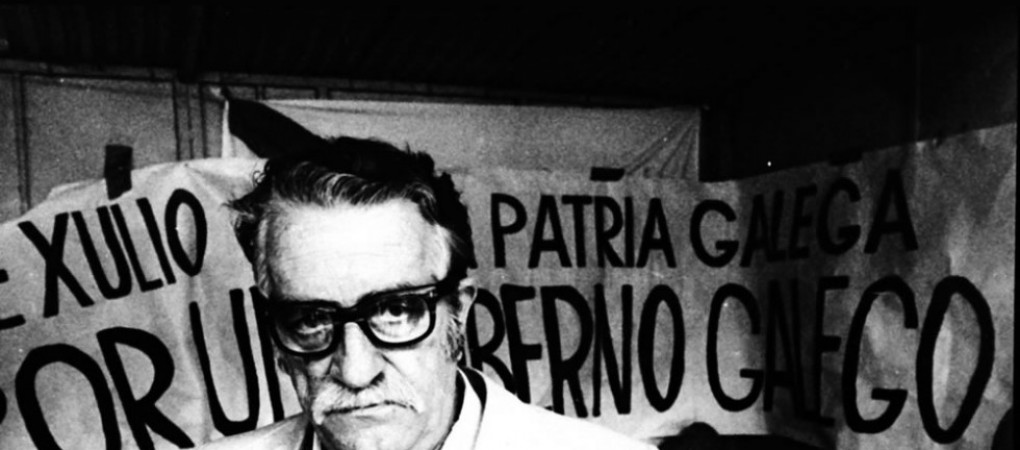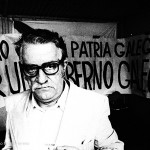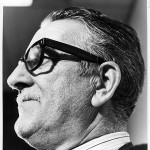1973-1979 Madrid
1912-1936 1936-1940 1940-1950 1950-1966 1966-1973 1973-1979
MADRID AND THE END
Early in 1973 he returns to Spain with destination Madrid, after that Álvaro Gil hires him to work in the magazine Tribuna Médica, where he was president of board of administration. Again many doors are closed to him in Galicia. He also works in the Ateneo Científico, Literario y Artístico of Madrid, where he directs the classroom of Culture in the section of Galician Literature since the first of July, 1974, developing a intense cultural activity, not without some controversy.
He publishes in bilingual edition, and printed by Editora Nacional, Onde o mundo se chama Celanova (1975), his most intimist book, marked by loving themes and the nostalgia of his childhood in Celanova, understood as lost paradise. This book of poems wins the Prize of Critique of Galician Poetry in 1976.
He publishes Al César enano (1975), a compilation signed with the pseudonym Stow Kiwotto Lumen. This work includes twelve anti-Franco poems written since 1961.
Edicios Castrelos prints A Taberna do Galo (1978), that aren’t “memoirs in strict sense, but imagined memoirs based on true stories”. Actually, this book picked up the first chapter of “Memorias de nunca” that never will be publish like such, though they preserves fragments. He publishes also Curros Enríquez: Obra poética completa (1977) and Cemiterio privado (1974) for Ediciones Expedientes of Caracas; and he edits his own Antología (1977) bilingual for Plaza & Janés of Barcelona (the only anthology , together the Portuguese Autoescolha poética (1972). He supervises the publication of the first volumes of his Obras Completas (1975, vols. I and II, 1981, vol. III) for Akal, and the revised and expanded version for Ediciones Júcar of Gijon of his classic biography about Curros Enríquez (1973).
Also he develops an intense cultural activity in very different places. Most notably is his participation, together with Carlos Velo and Méndez Ferrín, in the Mexican tribute to León Felipe in 1973, or the representation of the Galician arts in conferences developed in Venice (1976), Almeria (1979) or Canaries (1979). He gives several speechs, in Celanova or Lalín, and takes part in a tribute to Antonio Machado in Salamanca.
He collaborates in newspapers such us ABC, where he writes the section “Mirador Literario: Escrito en Gallego”, covering the literary Galician innovations.
Celso Emilio situates himself in the orbit of Partido Socialista de Galicia (PSG) and he postulates as a candidate of Candidatura Democrática Galega in the first general elections of 1977 to gain a seat of senator for Ourense. Fully implied in this electoral process, he takes part in the campaign with political speechs in Ourense, A Coruña…, and reciting the “Romance eleutoral do cego de Trasmiras”. He falls a thousand of votes short of being elected. On the other hand, in the last years of his life he moves closer to the postulates of PSOE.
On August 30, 1979, while he was enjoying a holiday period in Vigo, he dies in his house and he is buried on September 1 in Celanova.
Posthumously, O libro dos homenaxes is published, Ferreiro had given the original to his friend Alonso Montero Xesús eight days before his death. The work is a compilation of texts, most of them already published in magazines or previous books. Júcar edits the stories El alcalde y otros cuentos, an autotranslation to spanish of the stories of A fronteira infinda, which in 2007 was re-edited under the title of La frontera infinita (Faktoría K de Libros).
There are many tributes to his memory, between which stand out the acts of the Polideportivo do Sar in Santiago de Compostela on October 28 and in the Palace of the Sports of Madrid on November 3.
In 1981 the city of Vigo institutes the Award of Poetry Celso Emilio Ferreiro, and at the same time a Foundation named after him is created in Santiago. In 1989 the Día das Letras Galegas is dedicated to him. This fact promotes the emergence of abundant studies and manuals on his work and his life.
Finally in 2003, marking the 25th anniversary of his death, numerous events are celebrated in his honor and there is a reissue of a significant part of his work, besides the publication of previously unpublished and not compiled work.
Related poem: Vispras
Chegou á derradeira encosta da montaña
coas misteriosas luces sobre os médanos,
co seu baúl ó lombo.
Dende aquí vexo o mar acolá diante,
dixo, axiña saberéi quén son.
O intre de zarpar vaise achegando,
é hora de ceibar as pombas.
Adeus, paisaxe irrepetivel da vida,
coas misteriosas luces sobre os médanos,
os insones abrentes
nos muiños albares da esperanza.
Adeus horas de dor e de ledicia,
lonxe ficou o páxaro dos soños
e o rito ardente da segreda ira.
Non voltarán as rosas
nen o esplendor dos máxicos fulgores.
O tempo pasa, devala o lusco-fusco,
escrito está nos siños das estrelas.
Se perdes a mañán, perdes o día,
quen perde a mocedá, perdeu a vida.
Related poem: Eiquí será
Á memoria de Aquilino Iglesia Alvariño
Quero morrer eiquí (cando me chegue
a hora da viaxe que me agarda).
Eiquí niste silencio de pombas arroladas,
niste vento que dorme nos piñeiros
un profundo soño de arelanzas.
Quero morrer eiquí cos ollos postos
no fumegar das tellas, na borralla
do tempo, frente a frente
de mín, aberta a ialma
aos latexos das horas, nunha tarde
ateigada de arpas.
Van e veñen as nubes viaxeiras,
as anduriñas pasan.
O pandeiro da chuvia
repenica unha maina
melodía de outono,
que no roncón do río se acompasa.
Quero morrer eiquí. Ser sementado
nesta miña bisbarra.
Finar eiquí o meu cansancio acedo,
pousar eiquí pra sempre as miñas azas.











